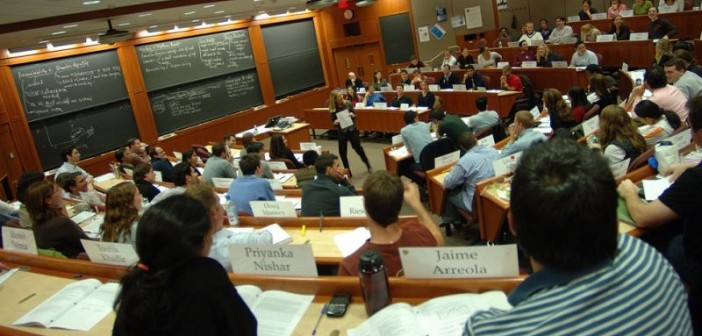The Harvard Business School (HBS) continues to maintain its low acceptance rate taking in only 930 students from a total 9,886 applicants that work out to be just 9.41% for the Class of 2020.
The percentage of women dropped one point to 41% from the Class of 2019. International students went up to 37% from the previous year’s 35%. US ethnic minorities constituted 27%, the same as last year. The average age of the cohort remained at 27 as in previous years.
The students represent 69 countries, 63% from the United States itself. Asia makes up for 14% followed by Europe 8%, Mexico, Central & South America 6%, Canada 5%, Africa 2% and Oceania 1%.
While 46% of the class had Economics & Business undergraduate majors, 37% came from STEM and 17% Humanities & Social Sciences.
The average GPA stood at 3.71, based on 692 students whose schools used a 4.0 grading scale.
In pre-MBA industry background, Consulting, High Tech/Communications, Venture Capital/Private Equity notched up 16% each. Financial Services recorded 11% followed by Government/Education/Non-profit 8%, Healthcare/Biotech 7%, Consumer Products, Energy/Extractive Minerals, Other Services 6% each and Industrial/Heavy Manufacturing 4%.
To support its research and case development process, the School maintains a network of 8 global research centres in Hong Kong, Tokyo, Shanghai, Paris, Buenos Aires, Mumbai, Istanbul, and Palo Alto.
In GMAT scores, 85% of the class recorded a total range of 610-800 with 28-51 in Verbal range and 35-51 Quantitative range. Median verbal was 42, Median quantitative 49, Median total 730.
In GRE scores, 15% of the class recorded Verbal range 147-170, Quantitative Range 151-170, Median verbal 165 and median quantitative 163.
HBS says MBA students are encouraged to think about different countries and different business contexts throughout their two years. While 28% of the cases taught in the first-year Required Curriculum, 38% of cases in the second-year Elective Curriculum are globally focused. Last year, more than half the new cases and 40% of all faculty research had a global focus and setting.
To develop a truly global mindset, it is mandatory for the first-year students to travel abroad—the global component of the Field Immersion Experiences for Leadership Development (FIELD) course—to work on a product or service idea in global markets.
ALSO READ: Yale Tops Economist Executive MBA Ranking 2018
More than half of all HBS cases have an international focus and a wide variety of MBA courses and cases directly address global business issues. To support its research and case development process, the School maintains a network of 8 global research centres in Hong Kong, Tokyo, Shanghai, Paris, Buenos Aires, Mumbai, Istanbul, and Palo Alto.
Over the last few years, international students have represented over one-third of the MBA class. Every section is in itself a virtual seminar in international relations, drawing talented students from all over the world—and from every industry and professional interest—into active discussions enriched by diverse perspectives and points of view.




